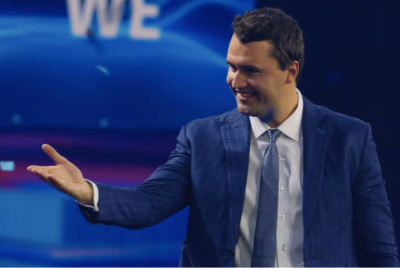Ukraine's Anti-Corruption Crackdown Sparks Largest Protests Since Russian Invasion Began

Ukraine's President Volodymyr Zelensky confronts his gravest domestic crisis since Russia's invasion as thousands of protesters flooded Kyiv's government quarter, defying air raid sirens and martial law restrictions to denounce his seizure of the country's anti-corruption agencies.
After three brutal years watching their sons and daughters die fighting the Russian war machine, ordinary Ukrainians took to the streets—not against Russian invaders, but against their president as they gathered outside President Zelensky's fortress-like compound on the intervening night of 22-23 July.
The demonstrations, Ukraine's largest since February 2022, erupted after Zelensky handed control of the National Anti-Corruption Bureau (NABU) and the Specialised Anti-Corruption Prosecutor's Office (SAPO) to newly appointed Prosecutor General Ruslan Kravchenko, triggering immediate warnings from Brussels and Berlin that Ukraine's hopes for EU membership hang in the balance.
🚨🇺🇦 Meanwhile Ukraine
— Concerned Citizen (@BGatesIsaPyscho) July 22, 2025
Massive protests happening in Kiev against the Zelensky & Ukrainian Government - they’ve finally had enough. pic.twitter.com/cXKZSeXt5h
The Moment Everything Changed
The timing has raised eyebrows across diplomatic circles. NABU investigators were reportedly closing in on Oleksiy Chernyshov, Zelensky's former deputy prime minister and confidant of his chief of staff, when Monday's dawn raids saw security forces storm detectives' homes, with one officer allegedly forced to unlock his phone using facial recognition.
Maria, a 28-year-old teacher from central Kyiv, clutched her toddler's hand as she explained why she'd risked arrest: 'My brother's fighting near Bakhmut. Every bullet, every medical kit, every piece of kit he uses—I need to know it wasn't stolen by some corrupt official first.' Her voice cracked. 'How can I look him in the eye if we let thieves rob his war?'
The protesters represent a cross-section of Ukrainian society: pensioners who survived Soviet corruption, students born after independence, and young parents pushing prams through crowds chanting 'No to dictatorship' and 'Remember Maidan.'
NABU and SAPO emerged from Ukraine's 2014 Revolution of Dignity, when over 100 protesters died demanding an end to endemic corruption. The agencies operated independently, securing convictions against ministers, judges, and oligarchs—until Tuesday's presidential decree placed them under prosecutorial oversight.
Young Ukraine Says No
The protesters aren't buying Zelensky's excuse about 'Russian influence.' Eighteen-year-old Vladyslava, who survived Russian occupation as a child, sees through the charade: 'I know what happens when one person controls everything. I won't let Ukraine become Russia.'
That's the generation Zelensky's lost. The kids who grew up believing Ukraine could be different, better, cleaner than the Soviet mess their grandparents endured. They're watching their president adopt the same authoritarian playbook Ukraine spent decades trying to escape.
What Happens Next?
Zelensky's gambling with Ukraine's future at the worst possible moment. His country desperately needs continued Western support—military aid, reconstruction funds, and eventual EU membership. Instead, he's handed his critics a gift-wrapped argument that Ukraine isn't ready for democracy.
The protesters understand what's at stake. They're not just defending two government agencies—they're fighting for the soul of their nation. Because if Ukraine emerges from this war looking like just another corrupt post-Soviet state, what was the point of all that sacrifice?
European Commissioner Marta Kos condemned the move as 'serious steps backwards,' whilst Germany's foreign ministry delivered an unprecedented rebuke, explicitly linking Ukraine's democratic institutions to future EU accession talks scheduled for early 2026.
Western partners have invested billions supporting these institutions. The US State Department expressed 'deep concern,' whilst UK officials privately warned that military aid discussions could be affected if democratic backsliding continues.
Ukraine requires approximately £60 billion in reconstruction funding, with EU membership offering the only realistic path to economic recovery after the war. Tuesday's protests suggest that Zelensky miscalculated domestic tolerance for institutional capture, whilst citizens continue to make daily sacrifices for democracy.
Today’s rallies in defense of the independence of Ukraine’s anti-corruption institutions in Kyiv.
— Illia Ponomarenko 🇺🇦 (@IAPonomarenko) July 23, 2025
The funniest part is that Russian Z-fascists are watching it, rejoicing and rubbing their hands, thinking these rallies somehow bring Ukraine closer to collapse and defeat.
While… pic.twitter.com/S4okD8LqbI
Opposition MP Inna Sovsun called the takeover 'political suicide,' noting that 73% of Ukrainians consider corruption their second-biggest concern after Russian aggression, according to December's Rating Group poll.
As protesters dispersed before Wednesday's curfew, their message resonated beyond Kyiv's streets: Ukraine's fight for democracy didn't end with Russian tanks—it continues in government corridors where transparency dies quietly.
The president's office declined comment beyond citing 'wartime security considerations.'
© Copyright IBTimes 2025. All rights reserved.




















